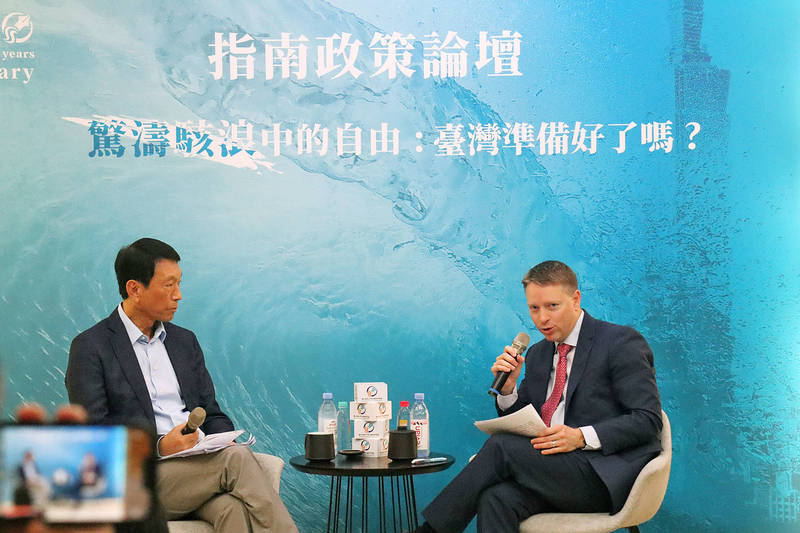Former US deputy national security advisor Matt Pottinger, right, speaks with former chief of the general staff admiral Lee Hsi-ming during an event in Taipei yesterday. Photo: CNA
PREPARED: China believes that Taiwan stands in the way of its 'great rejuvenation,' but it would not take action based on recent military bolstering, a former US official said
By Shelley Shan / Staff reporter
Extending the term of conscription from four months to one year is unlikely to provoke Beijing to attack Taiwan, former US deputy national security advisor Matthew Pottinger said in a speech at National Chengchi University yesterday.
Although history has shown that aggressors sometimes launch pre-emptive wars against adversaries they fear might one day achieve military superiority, the Chinese Communist Party (CCP) does not believe Taiwan would ever have the capability to invade and annexid China, he sa
“The move to twelve months of subscription service is a statement of Taiwan’s society-wide commitment to defend its sovereignty,” he said.
“It also sends a warning to Beijing to be cautious. Such messages must be sent as often as possible, in as many ways as possible,” he said.
The CCP is prone to making grave miscalculations, and Chinese President Xi Jingping (Xi Jinping) could be as prone to misplaced optimism about war as Russian President Vladmir Putin was, Pottinger said.
The CCP's cognitive warfare campaigns against Taiwan are achieving some success, he said.
Some Taiwanese media are reflecting Beijing's propaganda, claiming that the US sees Taiwan as its “pawn,” and might even want to “Ukraine-ize” the nation by luring China into a war that would destroy Taiwan and weaken China, while the US stands on the sidelines, he said.
China has also said that Putin's invasion of Ukraine was an “understandable” response to the long-standing existence of NATO, and in the same vein, Taiwan might provoke China if it bolsters its defense capabilities, he said.
“The goal of the US is to work closely with Taiwan and other allies and partners to deter a cross-strait war that would be catastrophic for every actor involved,” Pottinger said.
“Americans — Democrats and Republicans alike — overwhelmingly view a Chinese attack on Taiwan as an especially grave threat to peace, security and democracy worldwide,” he said.
“The US believes it must deter a war the same way it would fight a war, by standing shoulder-to-shoulder with Taiwan in peace and, if necessary, in war,” he said.
Putin knows that NATO does not threaten Russia any more than Taiwan threatens China, but it does stand in the way of Putin's dream of building a European empire, Pottinger said.
Failure to deter Putin's war in Ukraine came not from threats against Russia, but from a lack of resolve by the US and its European allies, as Putin took steps to subvert Ukraine's sovereignty in recent years, he said.
“Likewise, a free and democratic Taiwan stands in the way of Xi Jinping's 'Chinese dream' of an Indo-Pacific empire," he added.
While it is difficult to predict the timing of a possible invasion by China, the world knows about Xi's intention to do so from his public statements, Pottinger said.
Unlike his predecessors, Xi, soon after taking power, said that the “Taiwan problem” would no longer be handed down to the next generation, he said.
Xi also made it clear that he views unification with Taiwan as a measure of success, and he cannot achieve the “great rejuvenation of China” without Taiwan being part of it, Pottinger said.
China's shift from using military threats to prevent Taiwan from declaring independence to aggression against Taiwan as it no longer seeks unification has also been used by Chinese propaganda to justify war, he said.
“It would be remiss not to respond to that by taking hard actions as an insurance policy,” he said.
The war in Ukraine has taught us that “a fiery resolve to defend one's homeland, family and way of life can compensate for inferior equipment, numbers and odds,” he said, adding that “demonstrably high reserves of will can be a deterrent against war .”
While US President Joe Biden has mentioned four times his intention to send the US military to defend Taiwan if China launches an attack, no statements can substitute for what Beijing calls “facts on the ground”: That the US, Taiwan and allies demonstrate “credible and demonstrable [ability] to burst China's delusion that war with Taiwan would be easy and successful," he said.
The military action that Beijing would take depends on China's capability, former chief of the general staff admiral Lee Hsi-ming said, adding that China would not take coercive military action unless it has sufficient capability to launch a full-scale invasion .
“We should establish capabilities to engage in asymmetric warfare, build well-trained asymmetric armed forces, and demonstrate strong determination and resilience to defend ourselves, both in the military and among civilians,” Lee said.
“We cannot build asymmetric warfare capability simply by buying Javelins, Stingers or other weapons,” he said.
News source: TAIPEI TIMES
